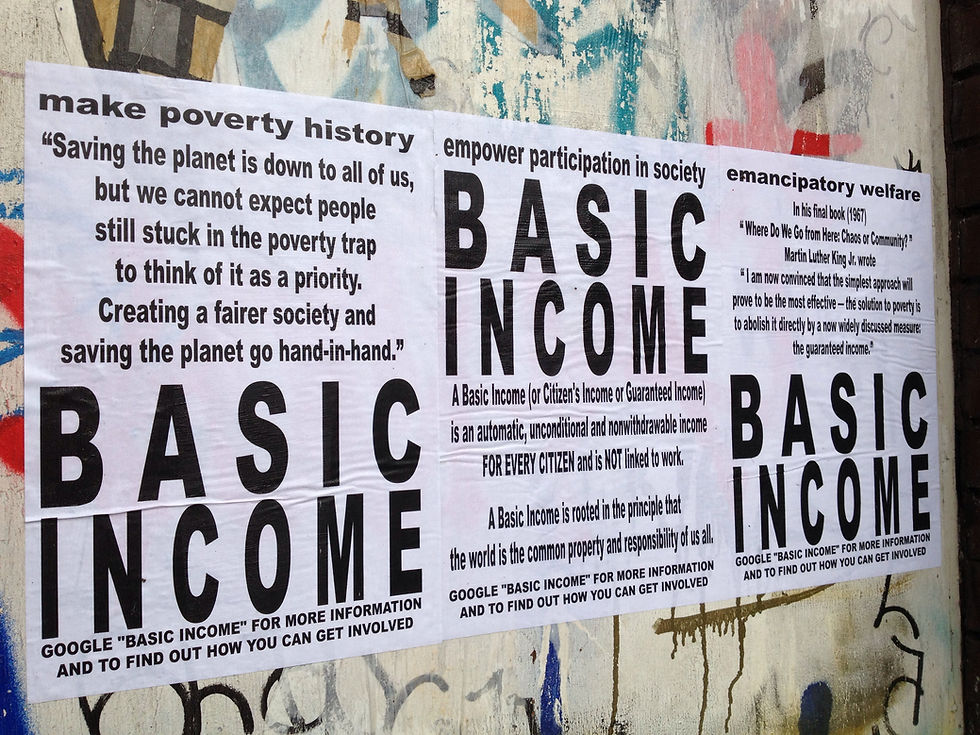UK Faces Deepest Recession since 2009
- Anishkaa Worthington
- Sep 8, 2020
- 4 min read
Updated: Dec 23, 2024
Anishkaa Worthington writes about the prospect of economic recession within the UK. The concern is a result of the coronavirus pandemic, which has rendered many jobless, and placed others on furlough schemes. As lockdown was enforced, thousands of businesses closed their doors; as it was eased, the government began to introduce financial incentives. This article identifies those who are likely to be hit the hardest, and discusses the situation on an international scale.
The UK has recently fallen victim to recession which will leave further people unemployed and vulnerable to redundancy. Between April and June 2020, economic output has decreased by an unfortunate 20.4%, which is a dangerous comparison to the 2.2% from the first three months at the beginning of the year. This is the first time the UK has entered a recession since 2009, when the “great recession” left many people devastated by financial instability. The World Bank predicted recessions would hit the countries where the COVID-19 pandemic has been the most severe. Between 1st March and 30th June 2020, there have been 50,335 deaths involving the coronavirus, and the UK has been ranked as one of the worst-affected countries, just below India, Brazil and Russia.

The COVID-19 pandemic resulted in a national lockdown, causing non- essential businesses to close whilst the British public were instructed to stay inside and work from home. Popular retailers such as TK Maxx, Selfridges and Primark temporarily closed down stores all over the UK, along with gyms, pubs and other non- essential businesses. A majority of retailers and businesses were able to open from 4th July 2020, so long as they met government safety guidelines about hygiene and social distancing. For instance, Marks & Spencer does not allow customers to use fitting rooms and Waterstones is quarantining books for 72 hours after customers have touched them. Many retailers, such as John Lewis and Debenhams, will be permanently closing down certain stores which will result in thousands of job losses.
The government set up the Coronavirus Job Retention Scheme, which introduced the furlough scheme in March. It provides those who are unable to do their jobs from home with 80% of their previous salary. However, money- saving experts such as Martin Lewis say that many employers are not exercising their “moral duty” of paying their employees through the furlough scheme. Chancellor of the Exchequer, Rishi Sunak, has announced that the furlough scheme will be finishing at the end of October, after being active for eight months. The consequence of ending the furlough scheme will be the increase in the rate of unemployment as companies will no longer be allowed to claim financial support from the government to pay employees. This means struggling businesses may fire staff members who they cannot afford to keep.
It is no surprise economic downturns are usually the hardest on young adults.
Millennials joining the job force during these times have the disadvantage of repaying student loans and accepting low- paid entry levels, despite having qualifications which deserve a higher pay grade. According to The Independent, young people from Black and Minority Ethnic backgrounds (BME) and working- class backgrounds are being pushed further away from job opportunities - disproportionately so, compared to their white counterparts.
Economists are also predicting the return of “boomerang” kids- an informal term which refers to young adults returning home to live with their parents. From a macro- economic perspective, such young adults will spend less on commodities, such as rent, and this will decrease aggregate consumer spending and national economic growth. According to the Resolution Foundation, a third of young people, between the ages of 18 and 24 years and were not students, have lost their jobs or put on furlough. In comparison, one in six adults, between the ages of 25 to 54 years, have lost their jobs or been furloughed. A reason for this significant difference is that more young people are employed by sectors that were unable to operate during the COVID-19 lockdown.
To promote consumer spending to boost the economy, Chancellor Rishi Sunak implemented the “Eat Out to Help Out” scheme. This scheme gave diners the opportunity to get a 50% discount on their food and non- alcoholic drinks when they chose to dine inside establishments every Monday, Tuesday and Wednesday only. The owners of such establishments could then claim back the discounts from the government. It was received with much praise, as demands were made to have the scheme extended beyond 31st August 2020. However, the scheme ended promptly on the given deadline.

Economists are concerned about the world economy as more countries are experiencing an economic downturn. Many European countries, such as Italy and Spain, entered 2020 with weak fiscal positions and are currently suffering from a technical recession caused by high unemployment and weak productivity. As a result of the global lockdown and five months of citizen protests, Hong Kong is said to be facing its worst recession ever. Industries such as tourism and retail have been severely affected in Hong Kong due to ongoing political turmoil and the COVID-19 pandemic.
Citizens across the world are being warned that difficult and uncertain times lay ahead as the international community is struggling to control an unprecedented global crisis.

_edited.png)



Comments